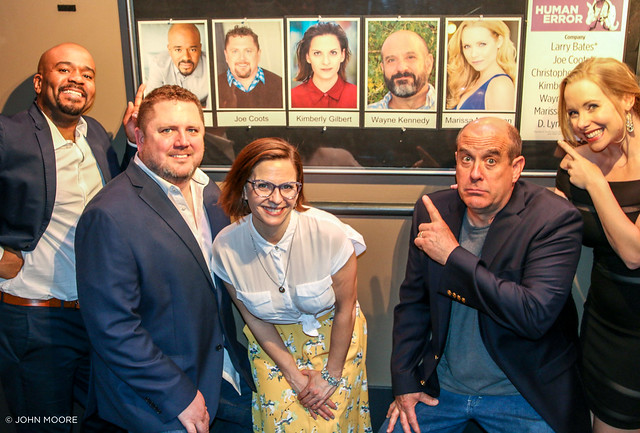DCPA NEWS CENTER
Enjoy the best stories and perspectives from the theatre world today.
Enjoy the best stories and perspectives from the theatre world today.
This article was published on May 29, 2018

Photos from opening night of ‘Human Error’ in Denver. Above, from left: Larry Bates, Joe Coots, Marissa McGowan, Kimberly Gilbert and Wayne Kennedy. Photos by John Moore for the DCPA NewsCenter.
(Note: Perspectives is a series of free public panel discussions held just before the first preview performance of each DCPA Theatre Company offering.
It’s not exactly breaking news that discourse in America is broken. But with ideological lines now drawn through the middle of American living rooms as definitively as borders, Human Error playwright Eric Pfeffinger and Director Shelley Butler think now might be a pretty good time for all of us to have a laugh together.
“I think we have to be realistic about the challenges we are facing as a nation, and we can’t minimize the gravity of them, but there is something to be said for approaching the world with a sense of humanity and even optimism in terms of our capacity to deal with those problems,” Pfeffinger said before the first preview performance of his world-premiere play, now in performance at the Garner-Galleria Theatre through June 24.
Human Error is Pfeffinger’s comedy about two very different couples: One NPR-listening, latte-sipping, blue-state liberals; the other NRA-cardholding, truck-driving, red-state conservatives. After an unfortunate mix-up by their blundering fertility doctor, the conservative wife is impregnated with the liberal wife’s fertilized embryo. Which sounds like an emotionally wrenching indie film that might inspire Oscar-worthy performances from the likes of, say, dramatic actors Tilda Swinton and Amy Adams.
Yeah, not so much.
“Most people would say: ‘Oh, what a terrible tragedy for everybody involved.’ And my reaction was: ‘That could be a funny comedy,’ Pfeffinger told audience members who gathered before the first preview performance of Human Error. “That’s a strategy that I employ a lot as a writer: I take this thing that is not at all comedic for anybody involved and try to make it funny.”
But something not so funny happened as Pfeffinger continued to develop his script after it was featured at the Denver Center’s 2017 Colorado New Play Summit and then chosen for full production to close out the 2017-18 season. “I thought I was writing a fun comedy about reproductive technology — because who doesn’t love those?” he said. “But as I started getting into the world of the play, I realized it was increasingly about these two couples and the echo chambers they have chosen to isolate themselves within. Now that they are forced to spend nine months together working this thing out, they can no longer demonize and caricature these other people who don’t think like they do. Because they learn to actually like each other in some fun and enlightening and surprising ways.
“I went into the writing of this play thinking it was going to be a dark illustration of how impossible it is for us to understand one another — and how we are doomed as a people. But it turns out my play had a more human outlook on America than I do.”
Here are five more things we learned at Perspectives:
1. Foot in mouth. Butler says Pfeffinger’s comedy-writing style is akin to situational comedy. Pfeffinger even provides a wink to the sit-com form by having his liberal dad-to-be — a black man named Keenan — work at a think-tank on the study of comedy, where he recently presented the topic: “Tumbling Over the Populist Footstool: Anti-Intellectualism in The Dick Van Dyke Show.” The kids may not know why that is so funny. But one of the most beloved opening sequences in TV history had Van Dyke (as Rob Petrie) come home from work and sometimes trip over his ottoman — and sometimes not. For six years, Americans never knew (and reportedly heavily bet on) whether Van Dyke would trip from week to week. The bit was dreamed up as a tribute to silent clowns from days of yore.
2. Wet blanket. OK, a quick reality check: In-vitro fertilization is a $3 billion industry in the U.S., responsible for more than 1 million babies. And mistaken embryo implantation is a real thing, too. There is no concrete data on its incidence, but here’s one couple’s particularly harrowing account. More often than not, these cases tend to go under the radar. Failure can be especially devastating, as a single round of IVF can cost a couple up to $20,000.
3. The Doctor is off. After reading the above item above, you can imagine that the fertility doctor in Pfeffinger’s play must be a bumbling, mumbling idiot to make that kind of mistake. And he is, thanks in large part to the comedic stylings of BDT Stage veteran Wayne Kennedy. “It’s possibly not the most flattering portrayal of a doctor in the American theatre,” Pfeffinger said. “I don’t know that the play is going to be endorsed by the American Medical Association. But Wayne Kennedy does a fantastic job of creating this guy who’s usually really good at this one very narrow, technologically specific branch of medicine — and then this thing goes wrong and suddenly he has to be good at working with people. … And he’s not good at working with people.”
4. The space case. Human Error is the first DCPA Theatre Company season offering ever presented in the Garner Galleria Theatre, more commonly home to ensemble musicals such as The Taffetas and First Date. And Butler says the space has presented several logistical challenges. Galleria shows typically offer wait service throughout the show, but that is not the case for Human Error because, well: A play is going on. “We’re really happy for people to buy drinks in the bar and bring them with them into the theatre,” Butler said, “but this isn’t a cabaret show.” The Galleria is also an intimate space but it does seat 200 in narrow rows that go back a long way. Careful not to lose any of the subtlety of the comedy, Butler has chosen to mic her actors in an inconspicuous way. “You may not even notice they are there, but the mics allow the actors to play the comedy the way the comedy wants to be played — and still reach the back of the house,” she said. “Eric has so many great throwaway lines (spoken as an aside, often no more loudly than a whisper), and with mics the actors don’t have to change their delivery in order for those lines to be heard.”
5. Working for a living. As playwrights go, Pfeffinger is a big deal, having had his works performed at the Humana Festival in Louisville, Ky., the Geva Theatre Center in New York, the Denver Center and more. He’s also a librarian at the Toledo-Lucas County Public Library in Ohio — and didn’t get to attend Friday’s official opening performance because he had to work his shift. “Yes, playwriting is very lucrative,” Pfeffinger said with a laugh. “The day job is just for fun.” Actually, even successful playwrights juggle writing with all sorts of outside jobs to pay the bills. “Even Tony Kushner will say, ‘If I’m weren’t writing these screenplays, you wouldn’t be getting these plays,’” Pfeffinger said. “That definitely influences the rhythm of my work. And when I have a great opportunity like this one in Denver, I have to take vacation time to do it. But I love working at the library. It keeps me in constant contact with a huge range of people — including the kinds of people who are in this play. I think working at the library informs my work as a playwright in an invaluable way.” But still, Butler added: “Every time Eric has to go back to the library, we get depressed.”

Chris Coleman delivers his first opening-night curtain speech as the new Artistic Director of the DCPA Theatre Company, at ‘Human Error.’ Photo by John Moore for the DCPA NewsCenter.
Video by David Lenk and John Moore for the DCPA NewsCenter.
Human Error
After an unfortunate mix-up by their blundering fertility doctor, Heather is mistakenly impregnated with the wrong child. Now two very different couples face sharing an uproarious nine-month odyssey of culture shock, clashing values, changing attitudes and unlikely – but heartfelt – friendships.

Leave a Reply
Want to join the discussion?Feel free to contribute!